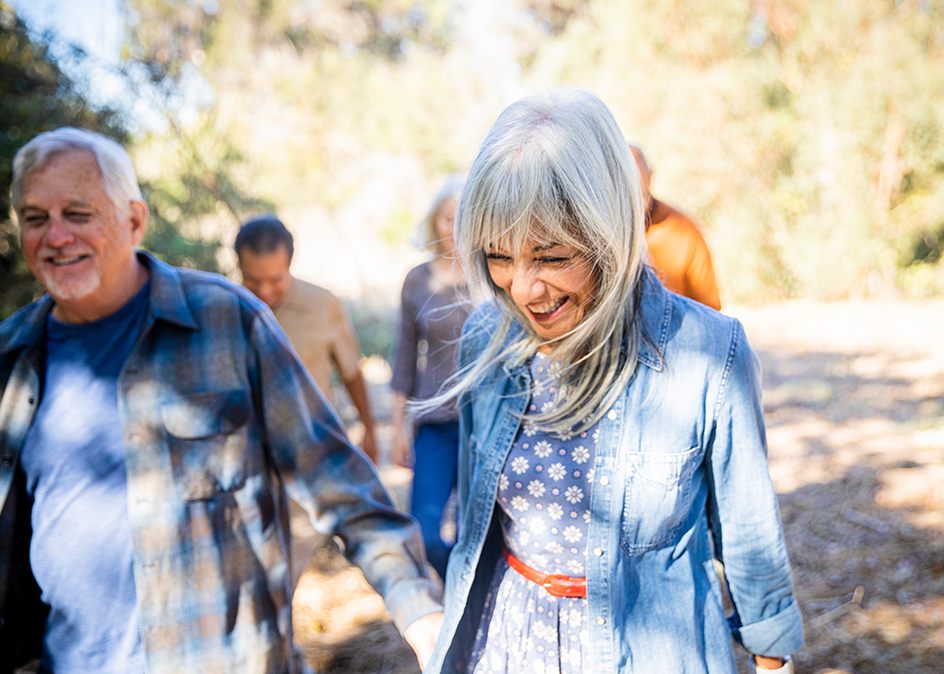
Imagine living alone for the first time in more than 50 years and you’ll start to understand the importance of social connections for seniors. Feeling lonely after her husband died, one senior moved to Amica after just a few weeks of being on her own. On her first day at the retirement residence, she was introduced to one of her neighbours and was grateful to have someone to talk to at dinner that night. Team members noticed the two heading to the new resident’s first fitness class together the next morning. The new friends have been enjoying each other's company ever since.
Maintaining a healthy social life makes life better at any age, but connection is especially critical for seniors. One study found that 24% of seniors in Canada feel socially isolated, which has similar health effects as smoking 15 cigarettes a day. Luckily, there are many ways for seniors to combat isolation and stay socially active to improve their mental, physical and emotional well-being. Learn more about the importance of having a healthy social life as you age and browse ideas on how you can improve your social health.
“Regular social interactions lead to happier and more fulfilled lives, which leads to positive impacts on health, wellness and quality of life,” says Amy Lee, Amica’s Life Enrichment Specialist. “I’ve noticed that seniors who are socially connected experience positive emotions, they are more likely to be physically active, they live with an improved sense of purpose and belonging, they are more adventurous about trying new things, and they show more self-confidence.”
Why is being social important for seniors?
Reflecting on your happiest memories, do you notice a common theme of being surrounded by friends and family? Being with people you love has short- and long-term benefits for your physical, emotional and mental health. As you find ways to engage with others, whether through local organizations or social activities at a retirement residence, you may find you have more energy, feel overall happier, and feel an improvement in your quality of life.
“One resident moved in and became so involved and busy in the residence the family had to call our concierge team and ask if their mom was okay because she hadn’t been in her suite for a couple of days to answer her phone. She was out living her best life, being socially active and involved in our life enrichment programs, so she was never in her suite!” says Lee.
While it’s not necessary to fill every hour with social plans, it is important to prioritize making time to see friends and family and getting involved in activities you enjoy on a regular basis to see the positive impacts on your overall health in your daily life.
Why do seniors struggle to maintain a healthy social life?
The effort required to plan, prepare, host or attend social events, however big or small, can create frustration or challenges for seniors. Barriers might include using technology, coordinating schedules, overcoming mobility or transportation issues or finding accessible local restaurants and grocery stores.
However, without a healthy social life seniors may experience signs of depression, isolation and a lack of motivation, and may become less physically active and more sedentary. Whether you’re used to a busy social lifestyle or not, try using your interests, passions and hobbies to guide you in finding ways to stay engaged. To get started, don’t be afraid to ask for help and support in implementing social plans into your daily or weekly routine.
“When our residents move into an Amica residence, we get to discover who they are as a person; we learn what is important to them in their lives, their family, friends, goals, interests and hobbies. Amica team members start to build connections and introduce residents to each other based on what we discover. We understand that feelings of belonging and connection to others are so important, especially for seniors starting out in a new community,” said Lee.
How can seniors improve their social lives?
It’s important to remember that being social is meant to bring you joy from seeing people you love and doing things you enjoy. Here are a few ideas to help you to start incorporating social activities into your calendar:
- If you haven’t been socializing recently, ease in by calling a few different friends or family members. This allows you to experience time being social without needing to get ready, plan ahead or travel.
- Once you’re ready to go out, start with simple plans that you are excited about and that don’t require much organizing. Plan to meet with friends for coffee or lunch.
- Join a local club that is focused on a hobby or passion. You can meet new people who share your interests and spend time doing what you love.
- Host a gathering where everyone brings a dish to enjoy or a game to play. This way you don’t have to plan and prepare everything yourself, and you can all share favourite foods (takeout or prepared foods work too) and activities together.
- Consider moving into a senior living residence in a great location where activities are planned for you in-house, and where your neighbours share similar interests and live a few steps away.
“At Amica, you get to choose your day, your way. Our Life Enrichment teams provide multiple outlets for our residents to participate in programs that promote a healthy social lifestyle. We support our residents’ choices, even if they choose not to participate in our programs. We are always supporting our residents to ensure they are engaged and connected with others in ways that interest them,” said Lee.
Book a virtual or in-person tour to find out what it’s like to enjoy living on your own terms in an elegant Amica residence with outstanding dining, amenities, activities, senior care and safety measures.
